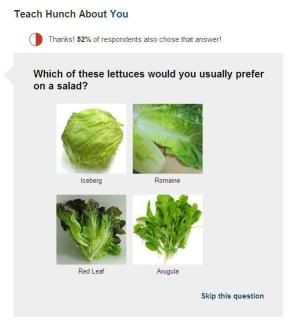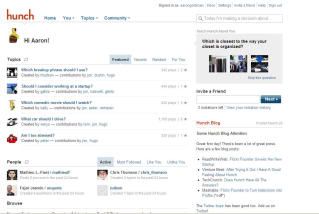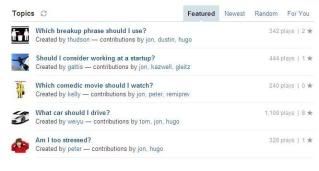Not-So-Natural-Born Google Killers
More Not-So-Natural-Born Google Killers
Even More Not-So-Natural-Born Google Killers
Still More Not-So-Natural-Born Google Killers
This series focused on what I called "not-so-natural-born" Google killers -- companies, individuals, and institutions (e.g. Wall Street, the Government, Amazon, eBay, end-users, etc.) that stood in the way of Google taking its perch atop the $500 billion global ad world.
You see, I had already dismissed the notion that a "natural-born" Google killer -- aka fancy new search engine -- would emerge. I've long held the belief that the Google habit is too well-formed.
Well, folks, we just may have a true contender in our midsts. And no, I'm not talking about Twitter (which, you'd have known if you read my last Search Insider piece -- What's the Point of Search?) As I said in my column, the point of search is to solve problems by using math or science to remove friction and create economically favorable outcomes for all.
Cue Caterina Fake, co-founder of Flickr. Today, she previewed her new project, Hunch, on her blog. What's the point of Hunch? In Caterina's words...
"Look. Decision-making is difficult, and decisions have to be made constantly. What should I be for Halloween? Do I need a Porsche? Does my hipster facial hair make me look stupid? Is Phoenix a good place to retire? Whom should I vote for? What toe ring should I buy?
It's dark and lonely work. Coin-flipping, I Ching consultation, closing your eyes and jumping, postponing the inevitable, Rock-Paper-Scissors, and asking your sister are all time-honored means of coming to a decision [Aaron here: Wonder why she didn't include Googling in this list of ways people make decisions?] -- and yet we think there's room for one more: Hunch.
Hunch is a decision-making site, customized for you. Which means Hunch gets to know you, then asks you 10 questions about a topic (usually fewer!), and provides a result -- a Hunch, if you will. It gives you results it wouldn't give other people."
Now we're talking! Caterina found the words I couldn't to describe the point of search. It's not about solving problems using math, science, or magic. It's not about economically favorable outcomes, yadda yadda. OK, it is about all those things. But all those things are encapsulated in this one simple concept -- decision making. That's what search is all about. And by recognizing this and building an entire platform around it, I have a hunch Caterina may have a shot at slaying the beast.
Update 3/30: Ok, I just got my invite to join Hunch today. Here's what I've found in my 30 minutes poking around...
First, to compile your profile and get a feel for who you are, Hunch asks you a series of questions ranging from fashion style to views on political issues to lettuce preferences.
I took about 10 minutes to answer no less than 143 questions about myself -- although they told me I only had to answer 10. From there, I finished filling out my profile, adding a pic and some basic personal info.
Then I toggled back to the homepage and saw my customized layout.
Click image for larger view
The first thing I noticed was the "query bar" at the top was unlike any search box I've seen before. Here I'm told not to input some dumb keywords, rather describe what decision I need to make...
When you put a "decision" into the bar, you get a drop down (ala query refinement) showing other "decisions" similar to yours that already have results. I found the relevance here to be spotty at best. (But c'mon, the site's only been live for a few months and admittedly will get smarter over time with more usage.)
The next thing that caught my eye was the feed of topics in the middle of the page. Here are actual "decisions" being made/posed by other "decision-makers." (Is that the right verbiage? These aren't "searchers" and you know how I feel about the term "users!")
There are tabs showing Featured, Random, Newest, and For You. So this is the basically the browse function. Again, I'm sure it will get more relevant and useful over time but I do like the Twitter aspect here to see real-time "decisions" (and the accompanying conversations) going on out there. Reminds me of YouTube as both a destination and a search engine...
Given my interest in Hunch as the potential Google killer, I decided to post my first topic on Google vs. Hunch and see what type of response I get...
I'll report back as the crowd (and algorithm) goes to town on my query and as I dig in further to the application. So far though, my hunch seems to be correct.
Update 3/30 #2: Been thinking about how Hunch will monetize. After all, you can't kill Google with good looks alone, right? Seems to me the answer here goes beyond standard sponsored listings -- although they could certainly backfill with AdWords/AdSense to get some immediate revenue.
There's no question that brands play a role in the decisions people make. Whether it be where to travel, what movie to see or even, per my example earlier today, how to make a good salad. The one thing that unites all good brands is they know there target audience. Based on the 134 questions I answered today (and that's before I quit -- there were plenty more!) Hunch knows me pretty well too.
Perhaps brands could pay for "product placement" in the algorthimic results -- a little paid inclusion, if you will.
From the How Hunch Works page: "Hunch's question selection algorithm tries to do two things. First, it tries to find a question which will discriminate well among the remaining possible decision outcomes for you - thus filtering the remaining choices from "many" to "fewer". Second, the algorithm looks for a question which can help optimize and rank the remaining decision results to present you with the ones you'll like the most. It's trying to ensure that you'll like outcome #1 better than outcome #5."
If brands go thru and answer the 100+ question diagnostic about their target audience, Hunch will be able to match their products and services to the right people for the right decisions. What brand wouldn't pay for that type of placement? And what decision-maker wouldn't be happy to receive brand-laden results? (As long as they were relevant.)
Here's more about How Hunch Works: "When a user clicks "Yes" or "No" to indicate whether or not they like a decision result, Hunch incrementally strengthens or weakens the mathematical correlation between that result and any 'Teach Hunch About You' questions that have been answered so far. So over time, Hunch might learn that people living in cities tend to prefer diet sodas, or that SCUBA divers tend to like bicycles with lots of gears. (we just made those examples ups, but you get the idea.) The academic name for this sort of algorithm is machine learning."
This takes the concept for the crowd-sourced search engine I outlined 5 months ago on the RM blog (which allows you to toggle results based on the preferences of various audience segments) one step further. Rather than just show you web assets that might be useful, Hunch actually shows you decisions (or outcomes) that might be useful.
Back to monetization -- so we have a sponsored listings model and a paid inclusion model. I can also see a Mint.com-like model where "decision-makers" can upload their personal finance information to Hunch for the algo to make specific decisions around how to invest their money. Like Mint, Hunch could get paid on a lead gen basis by all the providers.
Or perhaps this could be a subscription-service with no advertising. Once they get people hooked on the service and knowing their ins-and-outs, it shouldn't be too hard to port them over to paying a monthly fee. After all, if people have invested time into Hunch getting to know them, and Hunch is saving them time when making decisions, it would follow that people would be happy to pay for some advanced service.
OK, that's enough fawning over Hunch for one day. Stay tuned for my Search Insider column on Wed. which will pick up where I left off 2 weeks ago with, "What's the Point of Search?" and, yep, your hunch was right, bring it back full circle to this thread.
Update 3/31: Interesting thread unfolding in the comments... Chris Dixon from Hunch stopped by to weigh in, suggesting that Hunch is not a Google-killer, rather a complement to Google. I appreciate the humility and that got me thinking about how smart with their go-to-market strategy is -- which spawned my Are you Hunch-worthy? post.
As for Hunch's Google-killer potential, I stand by my claim. As I said in my response to Chris, searching for results, answers, facts, etc. is just one small step in the decision-making process. If Hunch can get to know us so well that we can skip all those steps and get right to the decision, we'll have forgotten all about the Big G and be all about the Heady H.
Update 6/11: According to the Hunch fact sheet the monetization plan is as follows...
"Some of the decision result pages on Hunch link to external sites where users can purchase the product or service that Hunch proposed. If they do, Hunch may earn a referral fee from the merchant."
The FAQ goes on to state that this sort of affiliate relationship will have no bearing on the results it provides. So I guess I was right with my guess about paid inclusion. Only seems right that Fake's Yahoo blood (recall she sold Flickr to Y!) has her blurring the church and state lines with Hunch.





4 comments:
HI Aaron,
This is Chris Dixon from Hunch. Interesting blog! We think of what we are doing as complementary to Google. If you want to find a fact like Abraham Lincoln's birthday, Google is the ultimate tool in our view. The reason we focused on decision making is we think it's an important activity and one for which Google is often just a starting point. Thanks for trying out Hunch and all your insightful writing. I'm going to go read your old posts now...
Thanks for weighing in Chris. Love that you guys are being humble and not going to market as the "Google-killer" -- lesson learned from Cuil, I take it?
As for Hunch complementing Google, I agree... in the short-term. There are times when you just want some results (or facts, as you put it) and other times you need to make a decision. That said, the need for facts or results are always tied to some sort of decision, right? Why would you need to know Lincoln's birthday? To make plans for your day off of work? To help you write your research paper? Etc.
Ultimately fact-gathering is part of a larger endeavor and if Hunch can string together all the facts that make up a decision, we can skip all those steps (and all those Google queries). I'm not saying this will happen anytime soon but I have to (and surely you do as well) believe that in 10-20 years, we won't be searching that way.
Right now "search" (aka Google) is like the old hunt and peck -- remember when you used to type with 2 fingers? As people (and your algo) matures, we'll evolve to a more sophisticated approach and laugh at the days we used the web to make decisions one fact at a time.
Looking forward to seeing this play out and thanks for participating in the conversation!
Hunch reminds me of one of the oldest games around..."20 Questions." It's all about narrowing down options through cutting down the hedges to get to the relevant answer (or the fruit for that matter). Either way, it sounds intriguing.
It sounds like websites would have to be optimized more meticulously than before to truly qualify for results. For example, a site like KosherHam.com doesn't really hit on the dietary laws of some Jews nor does it have anything to do w/ Eckerich, Carl Buddig, or a delicious tasting dinner on Easter Sunday. Would the results of Hunch be based upon the info inserted into meta tags, titles, etc like typical SEO?
Instead, Kosher Ham is a funny and sarcastic t-shirt/clothing company doing its best to define and make fun of current trends in pop-culture, society, The Snuggie... you name it!
Would the spiders pick-up the same info that they currently read now? As SEO changes on sites, will the relevancy of the personalized results on "Hunch" change too?
Post a Comment